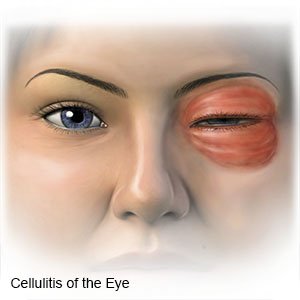Orbital Cellulitis
Medically reviewed by Drugs.com. Last updated on Aug 4, 2025.
Orbital cellulitis is a bacterial infection of your eye and the tissue around your eye. The nerves that go to the eye are also infected. Orbital cellulitis is a serious condition that can lead to blindness.
 |
WHILE YOU ARE HERE:
Informed consent
is a legal document that explains the tests, treatments, or procedures that you may need. Informed consent means you understand what will be done and can make decisions about what you want. You give your permission when you sign the consent form. You can have someone sign this form for you if you are not able to sign it. You have the right to understand your medical care in words you know. Before you sign the consent form, understand the risks and benefits of what will be done. Make sure all your questions are answered.
An IV
is a small tube placed in your vein that is used to give you medicine or liquids.
Medicines:
- Antibiotics treat the bacterial infection. Antibiotics are given through an IV for up to 10 days.
- Acetaminophen decreases pain and fever. It is available without a doctor's order. Ask how much to take and how often to take it. Follow directions. Read the labels of all other medicines you are using to see if they also contain acetaminophen, or ask your doctor or pharmacist. Acetaminophen can cause liver damage if not taken correctly.
- NSAIDs , such as ibuprofen, help decrease swelling, pain, and fever. This medicine is available with or without a doctor's order. NSAIDs can cause stomach bleeding or kidney problems in certain people. If you take blood thinner medicine, always ask if NSAIDs are safe for you. Always read the medicine label and follow directions. Do not give these medicines to children younger than 6 months without direction from a healthcare provider.
- Prescription pain medicine may be given. Ask your healthcare provider how to take this medicine safely. Some prescription pain medicines contain acetaminophen. Do not take other medicines that contain acetaminophen without talking to your healthcare provider. Too much acetaminophen may cause liver damage. Prescription pain medicine may cause constipation. Ask your healthcare provider how to prevent or treat constipation.
- Steroids help decrease redness and swelling of your eye.
Tests:
- A vision test may show how well you can see and move your eye. Your eye pressure may also be checked.
- Blood tests may show how well your infection responds to treatment.
- A sample of fluid or tissue from your eye or sinuses may be needed. This sample may show what areas are infected and if a different antibiotic is needed for treatment.
- A CT or MRI may show an abscess, rupture (tear), a blood clot, or other problems. You may be given contrast liquid to help your eye show up better in the pictures. Tell the healthcare provider if you have ever had an allergic reaction to contrast liquid. Do not enter the MRI room with anything metal. Metal can cause serious injury. Tell the healthcare provider if you have any metal in or on your body.
- A lumbar puncture may show infection, bleeding around your brain or spinal cord, or other problems. A needle is inserted in your back and fluid is removed from around your spinal cord. The fluid is sent for tests.
Surgery
may be needed if your infection is severe and your vision is damaged. Surgery is also needed if an abscess or nasal sinus needs to be drained, or to remove a foreign object.
RISKS:
The infection may spread deeper in the eye socket or spread to the other eye. This can lead to blindness. If the infection spreads to the brain, life-threatening blood clots or an infection can develop.
CARE AGREEMENT:
You have the right to help plan your care. Learn about your health condition and how it may be treated. Discuss treatment options with your healthcare providers to decide what care you want to receive. You always have the right to refuse treatment.© Copyright Merative 2025 Information is for End User's use only and may not be sold, redistributed or otherwise used for commercial purposes.
The above information is an educational aid only. It is not intended as medical advice for individual conditions or treatments. Talk to your doctor, nurse or pharmacist before following any medical regimen to see if it is safe and effective for you.
Learn more about Orbital Cellulitis
Treatment options
Care guides
Further information
Always consult your healthcare provider to ensure the information displayed on this page applies to your personal circumstances.
